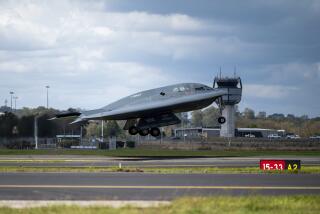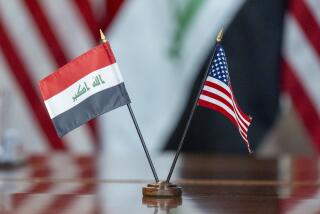Get-Tough U.S. Bombs Suspected Rebel Site in Iraq
- Share via
FALLOUJA, Iraq — The U.S. military launched a retaliatory airstrike Monday on a suspected guerrilla hide-out south of the capital, a military official said, marking the third time in recent days that warplanes had bombed a site linked to a fatal attack on U.S. troops.
The precision bombing effort -- which has yet to produce a known casualty, U.S. officials say -- appears to be a fresh strategy designed to strike back forcefully at combatants inflicting rising casualties on coalition forces.
“This was basically a show of force to say, ‘Hey, we’re still here and we can still do damage if we want to .... We can still make your life miserable unless you cooperate,’ ” said a senior official at the Pentagon. The get-tough airstrikes are a reprise, albeit on a much smaller scale, of the bombing campaign during the Iraq war intended to “shock and awe,” the official said.
However, U.S. authorities said there has been no major shift in military tactics. Airstrikes have been launched against enemy targets since the end of major combat operations was declared May 1, including the bombing of a suspected terrorist camp in western Iraq this summer. But officials could not immediately confirm whether earlier attacks used a 500-pound bomb, the type used in two of the recent strikes.
The aggressive new approach was in evidence Friday evening, when fighter jets dropped two 500-pound bombs near the verdant banks of the Tigris River outside Tikrit, Saddam Hussein’s longtime tribal power base. The bombs detonated not far from the spot where a Black Hawk helicopter went down earlier in the day, killing six soldiers on board. Officials suspect enemy fire in the crash.
Also in Tikrit, soldiers destroyed several buildings believed used as guerrilla staging areas and launched a campaign to seize enemy combatants.
On Saturday evening, air support was called in to put down an ambush against an armored patrol northeast of Fallouja, said Maj. Steve Sears of the Army’s 82nd Airborne Division. Fallouja and Tikrit sit squarely in the so-called Sunni Triangle, a hotbed of anti-U.S. activity.
“We happened to have air cover that night, and someone who was qualified to direct that asset, and they had eyes on these guys [the attackers],” Sears said. Three 500-pound bombs fell from the sky.
The site was near the spot where two 82nd Airborne paratroopers had been killed earlier Saturday, when an improvised bomb destroyed their armored vehicle.
“The message to the people who are shooting at us is that we’re going to kill them, we’re going to capture them, or we’re going to destroy their sanctuary,” Sears said. “We’re going to do one of those three things.”
Monday’s bombing demolished a vacant house in Mamudiyah, 15 miles south of Baghdad, that authorities suspect was used to stage an ambush last week that resulted in the death of a U.S. sergeant, Sears said. A search of the house had turned up a cache of sophisticated military equipment, including night vision devices and softball-sized homemade bombs that could be tossed by hand, he said.
Sears said that authorities cleared the neighborhood an hour before the 6:30 p.m. strike and that six suspects had already been taken into custody in connection with the ambush.
The aerial assaults came as Army Gen. John Abizaid, head of the U.S. Central Command, and other ground commanders met with provincial leaders in Iraq and warned of the dangers of noncooperation with U.S. authorities. The goal was “to reinforce to the community that the enemy is hurting not just the U.S. but the others around them, and that everyone would agree that the goal is a safer environment,” said the senior official in Washington.
Commanders made clear to the provincial leaders that deteriorating security could lead to less international aid for the rebuilding of schools and other crucial tasks. “It’s not that we’re trying to punish them for not cooperating,” the official said. “But if it isn’t safe, the NGOs [nongovernmental organizations] aren’t going to be able to get in and do any work and neither is [the military].”
The U.S. military said insurgents struck again late Sunday, firing a rocket-propelled grenade at a military police convoy near Iskandariya, 40 miles south of Baghdad, and killing a soldier from the 18th Military Police Brigade.
In Baghdad on Sunday, an American soldier fatally shot the chairman of the U.S.-appointed local advisory council in the heavily Shiite Muslim-populated Sadr City district after an argument over security, officials reported.
Muhanad Kaadi had been barred from entering the courtyard of the District Advisory Council building due to stringent security measures put in place to prevent car bombings, said a statement issued by the U.S. military. It said Kaadi refused to follow instructions from an “on-site security official.”
Associated Press quoted a witness as saying a driver emerged from a vehicle that had been barred from entering and began arguing with one of the guards and trying to grab his weapon. The U.S. military said the incident was under investigation.
Kaadi was a well-known figure in Sadr City and had been criticized by some residents for cooperating with the American forces. It was unclear whether the shooting would lead to increased tensions in the sprawling low-income area, where residents have often demonstrated against U.S. actions during the occupation.
*
McDonnell reported from Fallouja and Schrader from Washington. Times staff writer John Daniszewski in Baghdad contributed to this report.
More to Read
Sign up for Essential California
The most important California stories and recommendations in your inbox every morning.
You may occasionally receive promotional content from the Los Angeles Times.










